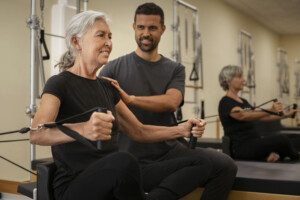
The Lancaster University study says older muscles don’t get more damage post-exercise than young muscles.
Maybe because older muscles can’t work as hard?
The study was published in Journal of Ageing and Physical Activity.
The investigation challenges the common belief that aging muscles are more prone to damage from exercise, and that recovery takes longer after the exercise.
The study examined how aging affects muscle function, soreness and the biochemical markers of muscle damage post-exercise.
The researchers analyzed data from 36 previous studies and discovered that older adults (over 35) did not experience greater muscle damage or loss of function compared to younger adults (18 to 25).
The study synopsis (I was not able to locate the actual study report) doesn’t name the specific forms of exercise other than that of strength training and endurance, and upper- and lower-body involvement.
How can older muscles be less damaged after exercise than younger muscles?
One of the key findings was that older adults reported less muscle soreness after exercise.
- On average, soreness was 34% lower at 48 hours.
- It was 62% lower at 72 hours
- These two metrics were in comparison to younger participants.
Additionally, creatine kinase levels, a marker for muscle damage, were about 28% lower in older people at 24 hours post-exercise.
This suggests that despite the natural changes that come with aging, muscles in older people are not as vulnerable as often assumed.
But should this be the only conclusion?
After all, wouldn’t it be far more likely that an older person can’t work out as hard?
Maybe that’s the reason they report less soreness and have lower creatine kinase levels?
Wouldn’t it be expected for a young adult who trains like a beast in the gym to have searing muscle soreness the next day (or often, two days later, a phenomenon called DOMS: delayed onset muscle soreness)?
Wouldn’t it be logical to conclude that someone under 35 is more likely to exercise strenuously, and thus, have more muscle damage after the workout?
If you visit a crowded gym and observe the people, the ones who are visibly working out the hardest tend to appear younger than 35.
And it’s not just with weights. It’s the use of cardio equipment or other forms of exercise, for which the younger people are more likely to be killing it than are the older ones.
So of course the muscles of older people are going to be less damaged, and of course older individuals are going to report less soreness afterwards!
As a lifelong strength training enthusiast who’s also made efforts to stick to a good aerobics regimen, and also as a former personal trainer, I’m really surprised that this study didn’t consider the possibility of the older person’s inability to train hard enough to induce significant muscle soreness or show higher levels of creatine kinase.
Yes, there are “old people” at the gym who perform very impressively, and there are middle-agers who seem to be the fittest people in the gym.
But this study examined a LOT of data to arrive at its conclusion. So it’s only logical to assume that the vast majority of participants involved were not those “super senior” types or ageless middle-agers we periodically see at the gym, at the park, on a hiking trail or wherever.
Dr. Lawrence Hayes, senior author from Lancaster Medical School, states in the report: “This research challenges the common belief that muscles in older adults recover more slowly or are more easily damaged during exercise.”
My question is, did the study authors adjust for the possibility that the vast majority of older participants were not able to hammer away as hard as the younger ones with any given specific exercise?
To put this another way, we can just assume that younger bodies can train more intensely than can old bodies.
Hence, younger bodies will experience a notable soreness that will reflect that hardcore workout — along with the much more elevated creatine kinase.
And what about the possibility that many of the older subjects deliberately parred back on workouts to avoid injury?
There’s a lot of content online about “Exercises You Should Never Do After Age 50,” and the like.
Many older people, particularly those who are new to regimented exercise, will take those articles very seriously.
Many have the mindset to “slow down, I’m getting older,” or, “I wonder if I’m too old to do this.”
These variables can easily explain the study findings.
The authors don’t explain the reason behind the findings, quite interestingly.
 Lorra Garrick is a former personal trainer certified by the American Council on Exercise. At Bally Total Fitness, where she was also a group fitness instructor, she trained clients of all ages and abilities for fat loss and maintaining it, muscle and strength building, fitness, and improved cardiovascular and overall health.
Lorra Garrick is a former personal trainer certified by the American Council on Exercise. At Bally Total Fitness, where she was also a group fitness instructor, she trained clients of all ages and abilities for fat loss and maintaining it, muscle and strength building, fitness, and improved cardiovascular and overall health.
.









































